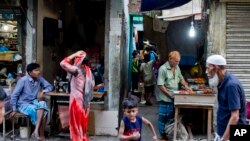Security officials in Bangladesh said they raided an area in the capital on Saturday and detained at least 100 suspects as part of a nationwide anti-drug crackdown, amid accusations that extrajudicial killings have taken place during the drive.
Over 60 suspected drug peddlers have been killed and over 3,000 suspects detained across Bangladesh in the crackdown, according to tallies by officials and local media. The campaign was launched earlier this month on orders by Prime Minister Sheikh Hasina.
Officials and local media have said the deaths occurred in shootouts between security officials and suspects or during raids, but rights groups have called the killings extrajudicial. The country's main opposition Bangladesh Nationalist Party has said many of its leaders and activists have been the target of the security agencies in the name of curbing the illegal drug trade. Some families have told local media that plainclothes men picked up some suspects and that they did not return alive.
Authorities have denied the allegations, saying they're following a policy of zero tolerance in the fight against drugs. The government has said many of the suspects have criminal charges against them.
Mufti Mahmud Khan, a spokesman for the Rapid Action Battalion, said security officials cordoned off part of Dhaka's Mohammedpur area on Saturday and detained at least 100 suspects. The area, which is locally called Geneva Camp, is a crammed slum and is known as one of the top spots for the selling of illegal drugs in Dhaka.
Bangladesh's leading English-language Daily Star newspaper reported Saturday that a total of 63 people had been killed since the anti-drug drive began on May 4. Other leading newspapers reported that some 3,000 people had been detained.
The crackdown is expected to continue for a few more weeks.
Domestic and global human rights groups have decried the campaign for the alleged extrajudicial killings.
Obaidul Quader, a close aide to Hasina and the ruling party's general secretary, said Saturday that the suspects have died in "shootouts," and that the killings should not be termed as extrajudicial.
New York-based Human Rights Watch criticized the authorities for the deaths. "The government has a duty to ensure law and order, but must order its forces to do so in a rights respecting manner," Meenakshi Ganguly, South Asia director for the group, said in an email Saturday.
"The authorities should order an impartial and time-bound inquiry into these killings during the crackdown on drug dealers and prosecute any police or (Rapid Action Battalion) member if they violated domestic and international laws," she said.
The anti-drug campaign began amid a concern in Bangladesh about the spread of "yaba" pills, especially among youths. Bangladesh does not produce the drug, which is made from caffeine and methamphetamine, and has blamed Myanmar for its production and the smuggling of it into the country through a porous border.




